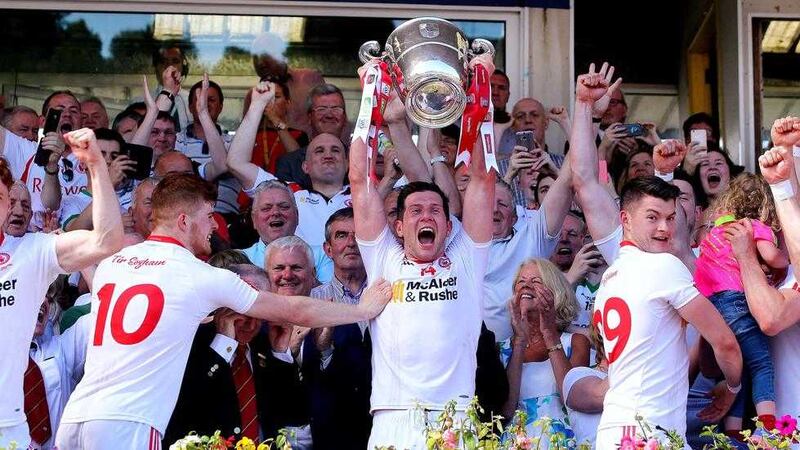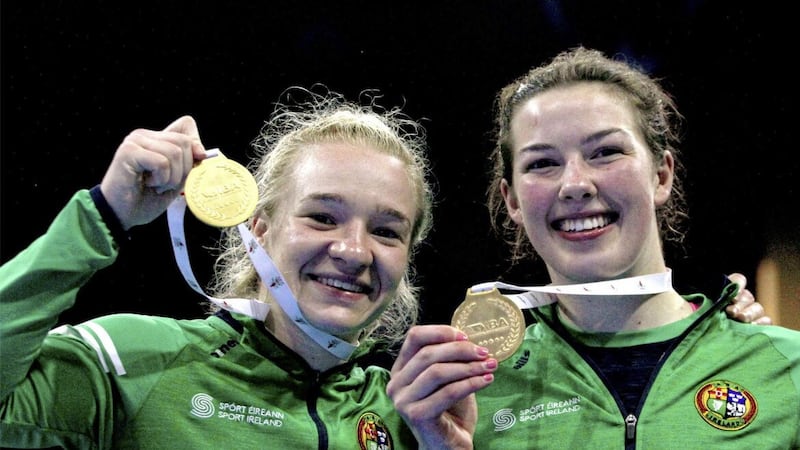ONE of the abiding images of the summer so far was Tony Scullion and Damian Barton embracing each other lying on the lush green velvet turf of Breffni Park last Saturday afternoon after Derry had just pipped Cavan in a Round Three Qualifier.
Scullion was undoubtedly the instigator of the mayhem.
As reporters made their way down through the throngs in the main stand, Barton appeared to be trying to lift Scullion to his feet but realised he couldn't and then decided to live the moment just as madly as his former team-mate and backroom team member.
The image was so emotive that it was flashed up on The Sunday Game highlights show the following evening.
From the tranquil comfort of my back room I tuned into the Ulster final between Tyrone and Donegal. It was the closest thing to chess on a football field.
I enjoyed the game from start to finish, but I'd be open to scrutiny on this.
As journalists, maybe we get too close to the game that we can no longer determine what's enjoyable and what's not so enjoyable.
The casual observer of Gaelic Games can be sufficiently detached to offer journalists perspective from time to time.
After a five-a-side game one Friday evening, I was shooting the breeze with one of the guys.
He's a retired Irish League footballer and was also a fine Gaelic footballer.
He told me he’s tried to sit down and watch Championship matches in recent years but finds himself changing channels after 15 minutes.
The modern game, he said, was alien to him and that he couldn’t enjoy it as a spectacle.
I can guess what he would’ve thought of the first half of last Sunday’s Ulster final – and the two ridiculous black cards issued by referee David Coldrick.
Mattie Donnelly and Cathal McShane’s big day was cruelly cut short by the most dysfunctional law ever visited on Gaelic football.
Donnelly and McShane deserved better from the GAA.
When the two Tyrone players trudged off the field before half-time I thought about the tears of joy that were shed at the ill-fated GAA Congress in Derry three years ago when over two-thirds of the delegates passed the black card rule.
Before Congress gathered, there were a thousand emotive column inches written by numerous commentators and ex-players declaring the black card to be the definitive panacea.
Cynical play would be drastically reduced, scoring averages would soar, blanket defences would evaporate.
It was nonsense then and is nonsense now.
Faced with declining standards in refereeing at elite level, the black card and its ugly appendages served to drive down standards even further.
In the midst of the debate of three years ago, dissent towards the black card was barely tolerated.
In the build-up to the 2013 Congress - and indeed at Congress itself - the anti-black card lobby must’ve felt like Communists during the McCarthy witch-hunt era.
I’d like to know where all the black card supporters are now?
They're like the impassioned ‘Brexit’ supporters who disappeared like the summer rain when they realised the folly of their weak and giddy motivations for change.
In these increasingly dumbed-down times we live in, Sean Cavanagh was held up as the game’s ‘bogey man’ and the reason why the black card was needed to outlaw indiscretions he committed in games Meath and Monaghan during the 2013 Championship.
It was as if cynicism was invented in 2013 and had been patented by Tyrone.
And yet, on Sunday, Cavanagh reminded us what a great footballer looks like and how Gaelic football is not entirely made up of clones.
Context is everything in sport. That's why last Sunday's victory over Donegal may well have been Cavanagh's finest hour.
In 2011 and '12, he suffered two bad shoulder injuries in the space of a year that required surgery and arduously long rehab programmes.
After the second shoulder injury, Cavanagh contemplated retirement. He could easily have walked away content with his three All-Ireland medals and five Allstars.
In recent times, the game had become more Darwinian too and there was a general acceptance that players of Cavanagh’s skills set were being nullified by sheer strength of numbers by the opposition.
Cavanagh had a young family while work becomes more important as you get older. As a result you struggle for reasons to hang around football teams.
After his three glorious points against Donegal on Sunday, I spent a fair bit of time in the archives room of the Irish News this week sifting through Tyrone’s greatest achievements since their first All-Ireland title in 2003.
There’s an established trend between Sean Cavanagh and big Championship games insofar as he invariably produces the goods.
I recall the day Tyrone drew with Cavan in the 2005 Ulster Championship. It wasn’t one of Cavanagh’s better days.
Former AFL player Nicholas Walsh of Cavan marked Cavanagh out of the game. It wasn’t always by fair means. Cavanagh learned a lot against Walsh that day in Clones.
The Cavan midfielder was voted man-of-the-match.
Six days later, Cavanagh faced his nemesis in the replay and gained revenge.
The Moy man was outstanding.
Interviewed at pitch-side afterwards, Cavanagh said: “Nicholas is a tough player and he certainly gave my fill of it last week. I had my professional charter exams all week and I was really looking forward to the replay and I think I did myself justice. I’m proud of myself.”
Cavanagh was 22.
He has always been brilliant to watch but everyone got a snapshot of what really makes Cavanagh tick in that Cavan replay 11 years ago.
Nothing's changed.
Cavanagh’s greatest strength as a Gaelic footballer is his competitive will.
Beneath his affable nature lurks a raging competitor. Last Sunday, nobody else on the pitch would have attempted those two kicked points.
If the ball had been in a different pair of hands, another option would have been taken - and Tyrone mightn't be Ulster champions.
Amid the dodgy black cards and replicated tactics that prevail, individual greatness can still flourish.
He may be 33 but there's no brighter light in the modern game.
We should enjoy Sean Cavanagh while we still can...








